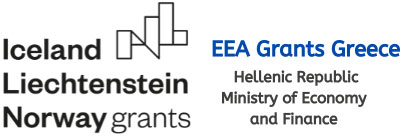Greece and the Donor countries are like-minded, sharing the same set of values and ideals. All four countries fully recognise and are showing a keen interest in the world and humanity’s challenges, such as the climate crisis, the humanitarian challenges, the need for sustainable use of natural and maritime resources, and the need for peace, stability, and security. All countries share the vision to work together for a green, competitive, and inclusive Europe, as the EEA Grants 2014–2021 communication message states, and they promote policies in this direction.
In the context of Memorandum of Understanding (henceforth: MoU), for the EEA Grants 2014– 2021 the Beneficiary State sets aside a sum at least equal to 2% of the total EEA FM 2014–2021 funding, so that a fund may be established to enhance bilateral relations between Donor Countries and the Beneficiary State. The exact amount is stipulated in the MoU. According to the MoU (signed between the Donor Countries and Greece on October 31, 2017), the budget allocated for the Bilateral Relations Fund amounts to €4.155.000 and is 100% financed by the EEA Grants 2014–2021.

The Bilateral Relations Fund is a flexible financing resource used to support initiatives aiming at strengthening relations between the Donor Countries (Iceland, Liechtenstein, and Norway) and Greece as the Beneficiary State, so that they may enhance their cooperation strategy, networking, and exchange of knowledge between their entities. The Fund should further strengthen political, professional, social, and economic ties and lay the foundations between the Donors and Greece.
The initiatives may be implemented within the Programmes agreed on in the MoU and are operated by Greek authorities, or through initiatives taken outside of the framework of the Programmes, managed by the National Focal Point (henceforth: NFP). The NFP also manages initiatives associated with the Programmes contracted directly by the FMC/FMO. The NFP shoulders the responsibility for the Bilateral Fund implementation monitoring and reporting in its entirety.
The Joint Committee for the Bilateral Funds 2014–2021 (JCBF), was established according to the Regulations on the implementation of the EEA and Norwegian Financial Mechanisms 2014-2021 (Art. 4.2) and of the Bilateral Guideline (Art. 3.2.1) and carries the tasks of:
- discussing matters of bilateral interests, identifying initiatives, and reviewing the overall progress toward reaching the objective of strengthened bilateral relations;
- adopting the Work Plan for the fund for bilateral relations to be discussed at the annual meeting; and
- identifying and allocating bilateral funds to programmes of bilateral interest.
Finally, the Bilateral Fund finances bilateral initiatives that contribute to the objectives of (a) reduction of economic and social disparities in the European Economic Area, and (b) strengthening of the bilateral relations between the Donor States and the Beneficiary States, through financial contributions primarily in the priority sectors, as set in the Regulation and the MoU:
- innovation, research, education, and competitiveness;
- social inclusion, youth employment, and poverty reduction;
- environment, energy, climate change, and low carbon economy;
- culture, civil society, good governance, fundamental rights and freedoms; and
- justice and home affairs.
Finding a partner for your EEA Grants project idea
Facilitating bilateral matchmaking online.
One of the two main goals of the EEA Grants is to increase cooperation and relations between the beneficiary and donor countries. Partnerships between entities from the beneficiary countries and their counterparts in Iceland, Liechtenstein and Norway are a fundamental part of the Grants.
However, finding the right partner for your project idea might be a challenging task under the covid19 era. Although face-to-face contact is often preferred for the development of bilateral relations, across the EEA Grants countries, bilateral matchmaking has moved to the online world. This article summarizes some of the resources that are currently available in an attempt to facilitate the process of bilateral matchmaking online.
Getting in touch with Donor Programme Partners
The Donor Programme Partners may often be able to assist you in finding the right partner for your project idea. In this link you will find a list of the entities acting as donor programme partners from the donor countries, including the area of activities, website, contact person, and contact details.




